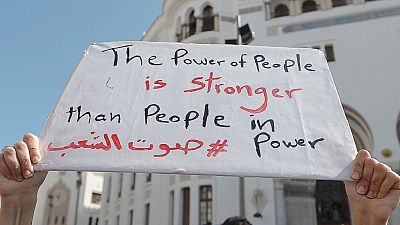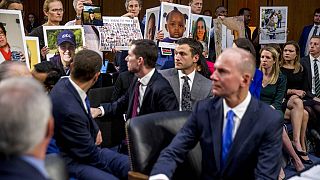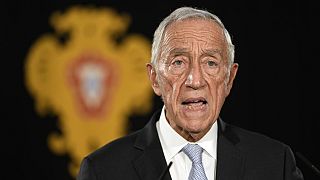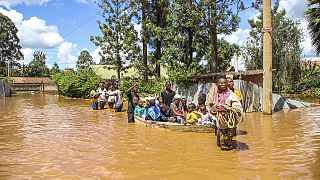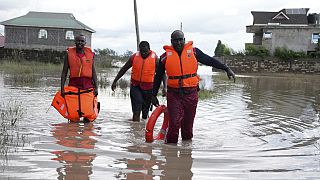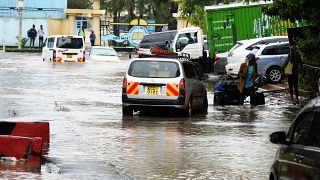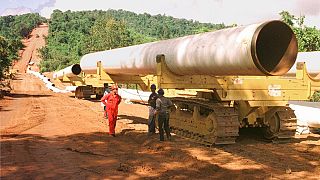Anti-government protesters marched in Algiers, the Algerian capital on Friday (March 15) demanding that the president steps down immediately, multiple news agencies reported.
Hundreds wielding placards and chanting slogans massed up at the capital’s landmark Grand Poste square with the demand that the president of two-decades, Abdelaziz Boutaflika leave office.
It is the fourth consecutive Friday that protests have rocked the capital. Ailing Bouteflika announced on Monday that he was not going to seek a fifth term in office.
But elections slated for April were also postponed indefinitely leaving most activists to speculate that the president and allies were doing all it takes to stay in power beyond his mandate.
PHOTOS from streets of Algiers ??
Summary of last few days in Algeria:
1- President Bouteflika confirms he wont seek 5th term
2 – New Prime Minister appointed
3 – Elections slated for April postponed
4 – Protesters demanding immediate “action” pic.twitter.com/5npzxYDpnb— africanews (@africanews) March 13, 2019
Algeria ruling party turns its back on Bouteflika: he is “history now”
Algeria’s ruling FLN party showed more signs of turning its back on President Abdelaziz Bouteflika on Friday, with one senior party figure saying in an interview overnight that the long-serving leader was “history now”.
Bouteflika has reversed a decision to stand for another term after mass protests against his rule. He has been losing allies rapidly in recent days since returning from medical treatment in Switzerland.
The remarks by Hocine Kheldoun to Ennahar television late on Thursday were another major setback Bouteflika, who hoped to pacify Algerians by promising to take steps to change the political landscape dominated by the president and the ruling elite for decades.
Kheldoun, a former spokesman for the ruling party, became one of the most senior FLN officials to break with Bouteflika publicly. He said the party had to look forwards and support the aims of demonstrators protesting against Bouteflika.
The FLN holds the majority in all elected assemblies, including parliament and local city councils.
Tens of thousands of Algerians have staged protests for weeks demanding a new era with younger leaders who would offer greater social freedoms and prosperity.
Bouteflika, 82, has rarely been seen in public since suffering a stroke in 2013, and the protesters say he is no longer in a fit state to rule. They took to the streets after Bouteflika, in office for 20 years, announced he would stand again, forcing him to reverse that decision this week.
“GAME OVER”
A former minister who is familiar with Bouteflika’s inner circle told Reuters that the president could not survive given the pressure building against him from Algerians of all social classes.
“Game over. Bouteflika has no choice but to quit now,” the former minister said on condition of anonymity.
More mass protests are expected on Friday in the early afternoon after prayers.
Many Algerians say that the ailing president and other veterans of the 1954-1962 war of independence against France should hand over power to young technocrats who can focus on unemployment, poor services and stamping out corruption.
Although Bouteflika will not stand again and named a new prime minister, he stopped short of immediately stepping down. He intends to remain in power pending a national conference on political change and a new constitution.
But his position is becoming more tenuous as he has lost one ally after another, including prominent members of the FLN, which has dominated since France’s defeat in 1962.
The military, which has traditionally played a behind-the-scenes power broker role, has distanced itself from Bouteflika and stayed in its barracks throughout the crisis. It is expected to retain influence under all scenarios.
Algeria was relatively untouched when the 2011 “Arab Spring” uprisings swept away veteran autocrats in the Arab world. Bouteflika and his allies, effective manipulators of the opposition, managed to avoid major unrest by spending oil money on the population.
Bouteflika was credited with ending a civil war against Islamist insurgents in which tens of thousands of people were killed in the 1990s, and many Algerians long accepted heavy-handed rule as the price of stability.
But the public has turned out onto the streets angry at deteriorating economic conditions and the ruling party’s failure to make the transition to a new generation of leaders despite the president’s failing health.



